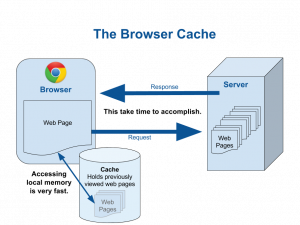INTRODUCTION
The task for this week’s assignment is to define a complex term to a non-technical audience, using a parenthetical definition, a sentence definition and an expanded definition. The expanded definition should use at least four expansion strategies, including a visual. Three or more references should also be cited.
Learning objectives for this assignment include:
1) writing technical definitions based on purpose and audience’s needs
2) understanding the difference in detail between three definition types
3) adjusting the level of detail based on the audience and situation
Based on the criteria and objectives, I have defined “cache” from the perspective of a software engineer who is addressing frequently asked questions of non-technical readers.
PARENTHETICAL DEFINITION
A computer stores frequently used data in a cache (memory storage for fast data access).
SENTENCE DEFINITION
Cache is a memory storage that technological devices use to quickly store and retrieve data.
EXPANDED DEFINITION
CACHE
FREQUENTLY ASKED QUESTIONS (FAQ)
What is a cache?
Cache is a memory storage that technological devices use to quickly store and retrieve data. In contrast to its non-technical term as “a hiding place especially for concealing and preserving provisions” (“Cache”), a technical cache does not hide information but provides fast data access. Both hardware and software use this memory component to find data more efficiently.
How does it work?
A technological device’s central processing unit (CPU) stores a small amount of data from main memory into the cache. (A CPU executes instructions to run a computer program.) During data retrieval, the CPU will search the cache first before checking main memory, as shown in Figure 1.

FIGURE 1. Comparison of Cache and Main Memory adapted from “What is cache memory?” Geekboots, 20 Feb. 2019, https://www.geekboots.com/story/what-is-cache-memory.
Compared to main memory, cache provides faster data access because it is smaller and closer to the CPU. If the CPU starts to access data from main memory regularly, the cache is updated with a copy of that frequently used data. This allows technological devices to execute recurring operations and repetitive tasks more quickly (“What is cache memory?”).
How is it used?
Figure 1 shows how a cache improves data access for hardware devices. It can also be used as an intangible memory storage for software applications. Web browsers such as Google Chrome and Safari use caches to store data for displaying web pages, as shown in Figure 2.

FIGURE 2. Web Browser Cache from “Browser Cache.” Aalpha, n.d., https://www.aalpha.net/blog/how-to-enable-speed-optimization-for-a-website/attachment/browser-cache/.
When visiting a web page for the first time, a web browser requests data from the server (computer that provides web page data) and waits for a response. By storing the received data into a cache, the browser will load the website faster upon future visits (Johnson).
Mobile applications (mobile apps) also use a cache to hold “images, videos thumbnails, search history, and other user preferences” (Johnson). This reduces the amount of data that needs to be downloaded every time the app is launched (begins to run).
How does cache maintenance impact computer performance?
Although well maintained caches improve computer performance, a cache that is full or contains corrupted data can cause applications to run slower or malfunction. This can be solved by clearing the cache (deleting all stored data in the cache) using actions such as:
- Turning off or restarting the computer
- Removing stored website data, followed by restarting the web browser (Johnson).
Works Cited
Britannica, The Editors of Encyclopaedia. “Cache memory.” Encyclopedia Britannica, 20 May 2021, https://www.britannica.com/technology/cache-memory.
Britannica, The Editors of Encyclopaedia. “server”. Encyclopedia Britannica, 16 Jul. 2021, https://www.britannica.com/technology/server.
“Cache.” Merriam-Webster.com Dictionary, Merriam-Webster, n.d., https://www.merriam-webster.com/dictionary/cache.
“Central processing unit.” Wikipedia, Wikimedia Foundation, 24 Sept. 2021, https://en.wikipedia.org/wiki/Central_processing_unit.
Johnson, Dave. “What Is a cache? A complete guide to caches and their important uses on your computer, phone, and other devices.” Insider, 7 July 2020, https://www.businessinsider.com/what-is-cache.
“What is cache memory?” Geekboots, 20 Feb. 2019, https://www.geekboots.com/story/what-is-cache-memory.
Leave a Reply